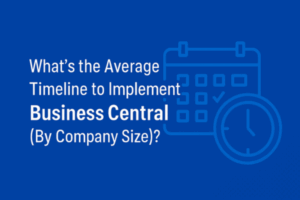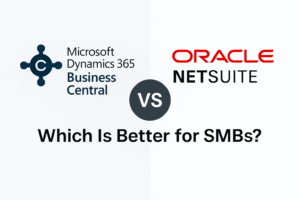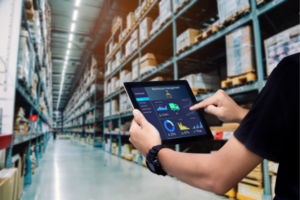Understanding ERP in Supply Chain Management
The global supply chain management market is poised to reach $37.41 billion by 2027. If you want to get success in this niche, an ERP tool is what you’re looking for! Let’s look into the fundamentals of ERPs and what role they play in SCM or supply chain management).
Fundamentals of ERP
This software system integrates essential business processes of an organization, such as:
- Sales
- Finance
- Marketing
- Manufacturing
- Human resources
- Payroll management
- Supply chain management
ERP systems streamline and automate business operations, improve communication, provide real-time visibility into critical business data, and take on mundane tasks of running a business.
Role of ERP in SCM
A survey says that some 8 in 10 startups with high-performing logistics achieve above-average revenue growth. You may wonder what SCM entails. Well, it involves managing the flow of goods & services from manufacturers to end consumers. Using an ERP, you can improve SCM easily by:
- Optimizing key functions like procurement and warehousing
- Giving you real-time visibility into critical business data
- Automating manual processes involved in SCM
- Reducing errors and improving efficiency
- Organizing your data properly
This way, you’ll gain key insights into how business is performing logistically. Maybe you’ll realize where you can make some improvements or which vendors cause the most delays. The key to improving your business lies in SCM, and nothing makes SCM more efficient than robust ERP software.
4 Key Features of ERP Systems
A Forbes article published in the summer of 2024 reveals that modern SCM-centric ERPs have released a lot of amazing features, such as automation, security, AI & machine learning, smart factories, and much more. However, the basic features of ERP systems in supply chain management include:
-
Inventory Management
ERPs give you access to real-time data on your inventory levels. So, you can perform these tasks:
- Optimize your stock levels
- Avoid sudden stockouts
- Track stock levels across different locations
- Set reorder points and automate restocking
ERP systems also provide visibility into your inventory costs, which helps you make informed decisions on pricing and promotions.
-
Order Management
ERP systems also provide end-to-end order management capabilities. From order entry to fulfillment, an ERP solution can do it all! So, you can:
- Automate your order processing
- Track order status efficiently
- Manage returns and refunds
With real-time data on your orders, you optimize the fulfillment process and improve customer services.
-
Procurement and Sourcing
If you need a centralized platform to manage your procurement and sourcing processes, ERPs will come to your rescue as well. So, ERPs made for SCM will let you:
- Automate your purchase orders
- Track your supplier performance
- Manage your industry contracts
This way, you can make informed decisions on supplier selection, pricing, and quality control.
-
Production Planning
Having trouble with production planning? Most ERPs will have amazing features for it, such as:
- Capacity planning and scheduling
- Tracking your work in progress
- Managing your bill of materials
Access to real-time data on your production processes will improve your efficiency, reduce your costs, and improve your quality control.
3 Challenges & Considerations for ERP Integration
Can’t wait to implement an ERP solution in your organization, can you? However, experts warn that 70% of recently implemented ERP solutions by 2027 will fail to meet their original goals. You must keep lots of different challenges in mind when integrating an ERP system into your supply chain management.
Selecting the Right ERP Software
Imagine the horrors of choosing an ERP software solution meant for retail, cannabis, manufacturing, or some other industry for your supply chain. Choosing the wrong ERP option leads to disaster! You have to choose an ERP software solution that meets your business needs and requirements. So, you must factor in stuff like:
- Usability
- Scalability
- Functionality
- Customization
Customization and Scalability
The two terms “customization” and scalability” are very important here. Here’s what these terms entail when we’re talking about an ERP for SCM:
- Scalability: Your SCM-specific ERM should be able to grow and adapt to your startup’s changing needs; otherwise, it’s not right for your company. For instance, a meat processing company may start using advanced tracking technologies as it expands; your ERP must integrate new tools and technologies without disrupting existing processes.
- Customization: ERP implementation fails when ERPs can’t meet the specific operational needs of an organization. For instance, a cannabis business might want to customize its ERP to include major new updated features like crop monitoring and weather forecasting. Without this customization possibility, the ERP is useless for that marijuana-growing company.
Always consider these two factors when integrating an ERP system into your supply chain management. Your ERP system should be able to grow and evolve with your business. It should also be flexible enough to accommodate your unique business processes and workflows.
Training and Change Management
Implementing an ERP system for the 1st time or replacing your previous one with a better ERP tool often leads to major shifts within your organization. So, your employees may feel like this transition has come upon them all of a sudden. If this happens, your ERP tool will not yield any results.
You need efficient change management strategies to counter this problem. That’s how you can get your employees to understand the new system and adopt it willingly.
How Can Alchemy 365 Help Your Business Grow?
Don’t lose to lose your competitive edge in the industry. You should rely on Alchemy 365 and take your startup to new heights of success. Alchemy 365 provides ERP solutions that can help modernize how you do business. Our software is flexible, mobile-friendly, and effortless to collaborate with. With Alchemy 365, you can unlock the potential of your supply chain and stay ahead of the curve.

















